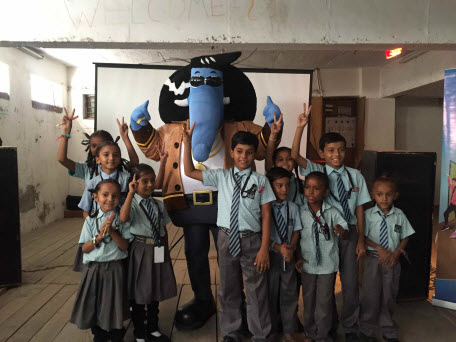Strategic School Event Management: Boost Attendance and Success
Organising a school event can be incredibly daunting. You have to coordinate multiple people and projects, both inside and outside of your school to pull it off. It’s little wonder that marketing is sometimes left as an afterthought - even though attendance is a big part of your event’s success (along with delivering on your event promises of course)!
41% of marketers believe that events are the single most effective marketing channel. That’s right - more effective than digital advertising, email marketing, or content marketing! Events are definitely something you want to get right, especially when it comes to School Event Management. That involves a little bit of strategy and a lot of planning. We’ve put together a guide to generate buzz and increase your attendance at your next school event. Whether it be a fundraiser, charity gala, awards night, reunion, open day, or musical - here’s how to set your school up for success.
1. Set your event KPIs
Before you start selling tickets, it’s important to set measurable KPIs that will help you work out whether your event was a success and help you strategise. In most cases, breaking even on your budget will be the top priority, but there are other measures of success that you might want to take into consideration.Once you have clear KPIs in place, it’s important that you communicate to your team and to the other stakeholders who will be involved in event planning. This will help you to focus, and ensure you don’t waste resources or budget.
Attendance
Attendance is a standard KPI for school events - after all, empty seats are never a good look - but there are a number of different ways to measure it. Your attendance goal might be tied to numbers, or it might be to ensure certain people in your community attend. You will also likely measure the number of people who RSVP’d to your event or purchased tickets and the number of people who actually checked in. If there is a big difference between the two numbers, you might need to investigate why this is happening.
Event satisfaction
Enjoyable events are a must, especially in school communities. One bad or boring event might affect attendance at a number of events into the future. Consider sending out a short survey directly after the event to find out whether the event was enjoyable overall, which aspects were the most enjoyable, and which parts need work.
Money raised
If you're organising a charity or fundraising event, then your event success will definitely be tied to a dollar amount. Set a goal, and then work out how many tickets or donations it will take to achieve that goal.
Enrolments
If your event is a school tour or open day, it’s important to measure how many attendees ended up applying for enrolment. Many schools are failing to see a return on investment from open days and are instead increasing private tours. Your school needs hard numbers in order to figure out what kind of admissions events are resulting in enrolments.
2. Choose your marketing channels
You'll likely have an overall budget that includes catering, venue hire, entertainment and more. A lot of the time your marketing budget will be whatever is leftover once all your other expenses are accounted for. Once you have a dollar figure to assign to marketing, you can work out which channels work within your budget.
School website
Your school website should be the base for all event-related information. You should be directing all of your advertising straight to a landing page that provides the location, cost of tickets, detailed agenda, speakers and RSVP date of the event. You can also use a customer relationship manageror event scheduling software to create a custom RSVP form on your landing page.
Email marketing
You can send out an invite to a segment of your database using a customer relationship manager or an email marketing platform . Why only a segment? Research shows that marketers who use segmentation report a 760% increase in engagement! To boost RSVPs, you can also include a strong CTA button that directs recipients straight to a dedicated form on your website where they can sign up for the event. These platforms also allow you to set up reminder emails for those who haven’t RSVP’d yet to keep your event top-of-mind for your audience.
Social media
Social media is a great way to promote your event. On Facebook, you can create and promote an event from your school’s page or using your Facebook Business Manager account. If you create a public event, it will be displayed on your page.
Direct mail
Have you heard? Direct mail is back. With an ROI of 29%, letterbox drops are losing their ‘old school’ reputation. Getting a letter in the mail has a much better chance of evoking an emotional response - especially if you add a personal touch, like a wax seal, some decorative ribbon or a handwritten signature.
When considering the cost of the invitations, you’ll need to factor in the cost of supplies to create the invitations, as well as postage or the cost of a distribution company if you are planning on inviting all of the residents of a particular company.
School app
If you use a school app, you’ll know how easy it is to engage parents through targeted communications. Most apps will have a school calendar feature where you can create and promote an event to a targeted segment of your school community. You can add all of the information that a parent will need to register for the event right in the app.

3. Drive a last-minute push
We’ve all been there. It’s a week or so out from your event and you’ve still got tickets to spare. It’s time to do some last-minute promotion. Your best asset? The people who have already registered for your event.
Encourage attendees to share the event with their own personal audiences - whether that be on their social profiles, in their meet-up groups or by forwarding them the invitation. You can also incentivise your attendees to invite their friends.When our Marketing team registered for the Interactive Minds Digital Summit, we received an email two weeks before promising to upgrade our tickets to VIP passes if another colleague at Digistorm registered. The VIP upgrade (which included a free professional headshot, along with other perks) was enough of an incentive for me to forward the email along to a few people in our organisation.
4. Remind, remind, remind
For many events, ticket sales are only part of your event’s revenue. The remaining revenue will come from sales or donations on the day. Your school musical will also make money from concessions and program sales. Your charity gala will also make money from items auctioned off on the night. This means you not only need to drive ticket sales - but you also need to ensure that attendees actually remember to show up!
Whether you're using a customer relationship manager, email marketing platform or event software to organise your events communications, it’s incredibly important to schedule in some reminder emails. You can also add little touch points into your regular communications to keep your event top-of-mind, such as:
- Adding an event link into your email signature
- Adding a notice into your school newsletter
- Presenting at the next P&F meeting
5. Create buzz at the event
Once your event is on, it’s tempting to sit back and enjoy the results of your hard work. But leveraging on-the-day buzz can set you up for easier event marketing in the future. One of the best ways to generate buzz is by getting attendees to share photos and updates on social media using your event hashtag.
For some events, it might be beneficial to project a live feed of event updates and photos onto either the main screen or a large screen at the event. Alternatively, you may want to incentivise social sharing by awarding prizes to attendees who share your event.

6. Measure and repeat
Once it’s all wrapped up and done, it’s time to take stock and work out whether your event was successful. This is where you will bring your whole strategy full circle and revisit the KPIs you set in the planning phase. Did you achieve your goals? Why or why not?It could also be beneficial to look at your communication channels to work out which ones drove the most RSVPs, and how much each RSVP cost per channel. Doing a review of your data will set you up for more successful school events in the future.
Key takeaway
Schools calendars are full of events that create brand awareness, drive enrolments and build revenue for the school or an associated charity. Creating event goals and a solid marketing plan is the key to ensuring your event is successful, and you are setting yourself up for more successful events in the future. Take a look at our ultimate guide to running school events for more handy tips and tricks!